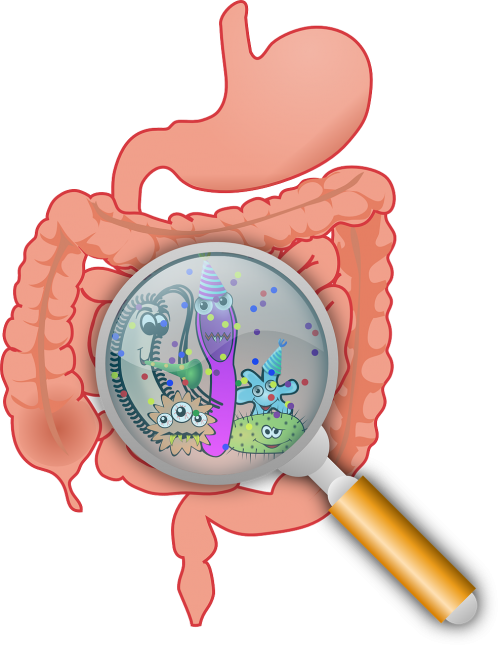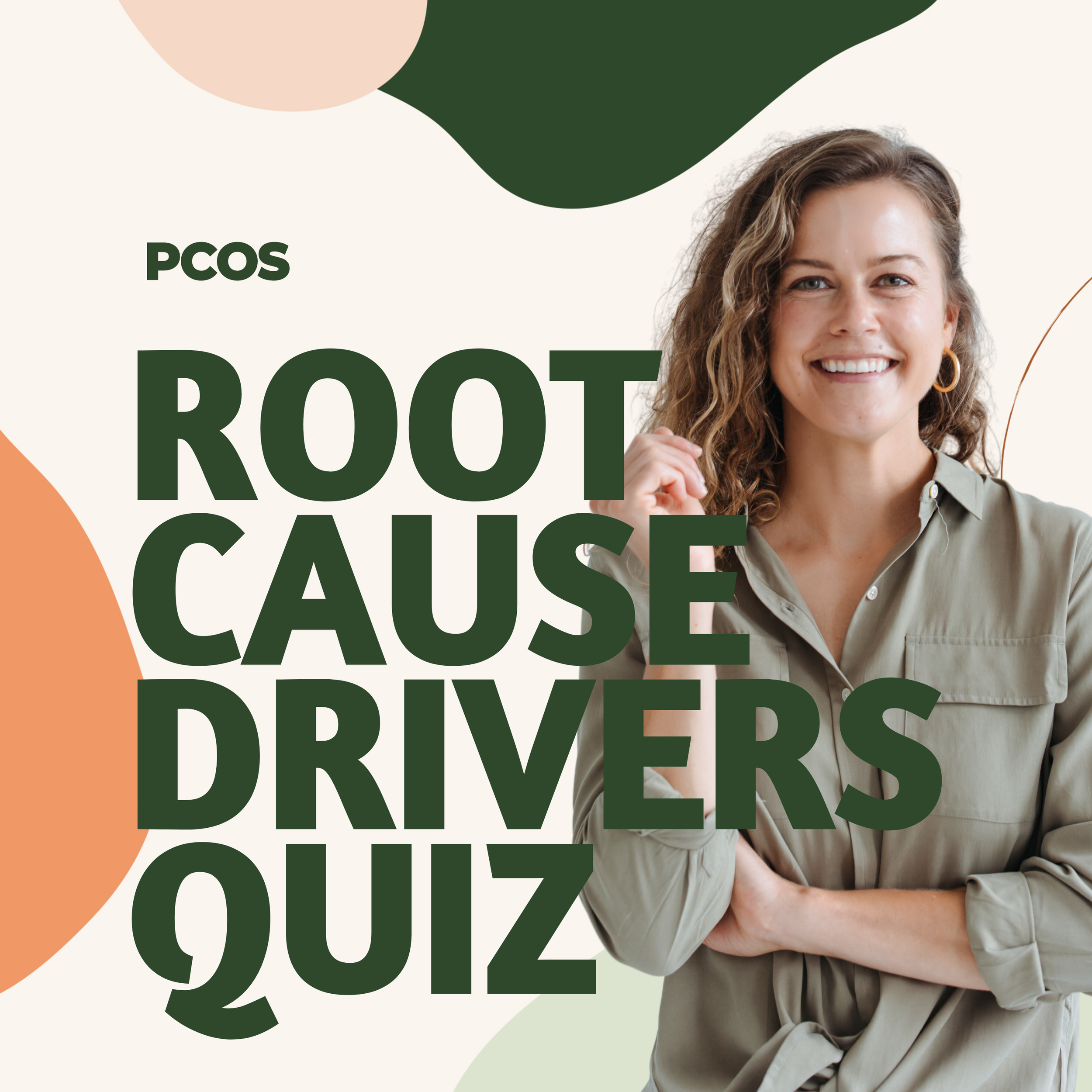The PCOS Gut Health Connection
If you or someone you know struggles with PCOS, you may have tried a variety of things to manage this frustrating condition. I’ve highlighted a number of natural strategies for managing PCOS and addressing the root causes in the past, but one that often gets overlooked is the connection between PCOS and gut health.
Let’s dig in and talk more about how your gut bacteria may be playing a role, and tips for supporting your gut health and managing your PCOS symptoms!
What is PCOS?
Polycystic Ovarian Syndrome or “PCOS” is an endocrine disorder that is estimated to affect 7–10%, or about 5-6 million women of childbearing age in the US. It is one of the most common causes of infertility because it interferes with a woman's ability to ovulate, or release an egg for fertilization.
In addition to infertility, other complications of PCOS include:
Irregular or absent menstrual cycles
High levels of androgens or “male” hormones, which may cause symptoms like acne, facial hair growth and head hair loss
Insulin resistance (thought to be a primary driver or “root cause” in PCOS)
Vitamin and mineral deficiencies
Chronic low grade inflammation
Pregnancy complications like gestational diabetes or high blood pressure
Obesity
Sleep apnea
Elevated cholesterol levels and heart disease
How Gut Health Impacts PCOS
The cause of PCOS is not yet clear, but newer research has started to explore the correlation between bacteria in the gut and a variety of metabolic disorders including PCOS.
In order to understand this connection between gut health and PCOS better, it's important to understand a few terms...
The microbiome & “dysbiosis”
The gut microbiome refers to the community of microorganisms living in the gastrointestinal tract including bacteria, fungi and viruses. The human gut microbiome primarily consists of bacteria that reside in the large intestine.
The microbiome plays many important roles in the body, including:
Digestion and absorption of food
Regulating the immune system
Managing inflammation
Producing vitamins
Balancing hormones, including insulin
Producing neurotransmitters which impact mental health
When there is an imbalance between the ratio of good and harmful bacteria, this is referred to as dysbiosis. Dysbiosis can lead to a variety of health complications. Studies have shown that women with PCOS have dysbiosis and less diverse gut bacteria than woman without PCOS, which may contribute to symptoms and disease progression. Researchers have also found that the higher the androgens, the lower the gut bacterial diversity is in PCOS. In addition, the complications associated with PCOS (obesity, insulin resistance, etc) may lead to worsening dysbiosis, further complicating things.
Intestinal permeability
This is another fancy term that refers to how intact the gut barrier lining is. Think of a healthy gut lining like a closed fist with minimal gaps in it. This intact lining protects our body against harmful microorganisms and toxins from entering. When the gut lining becomes “permeable”, however, it looks more like an open hand with the fingers spread out. There are many gaps present which allow these harmful products to enter which may contribute to the pathophysiology of inflammatory diseases (and we know that chronic low grade inflammation is a key driver in PCOS!).
Both dysbiosis and increased intestinal permeability are known to be present in PCOS. The oral contraceptive pill is also a common treatment for PCOS in conventional medicine, yet studies show that this can actually make the gut microbiome worse and contribute to intestinal hypermeability
Symptoms of poor gut health
Most people think of things like constipation, bloating, and diarrhea when it comes to gut issues. While these can occur, there are also many more subtle symptoms of an imbalance gut, such as:
Skin issues like eczema, acne, and rosacea
Irregular bowel movements. A good rule of thumb is to be having an easily passable complete bowel movement once per day.
Food sensitivities and intolerances, whether they are new or have been around for a while
Nutrient deficiencies, which can be diagnosed by lab work.
Mood disorders like anxiety and depression
Discover the root causes of your PCOS symptoms and take control of your health today!
Take our quiz now to uncover the biggest drivers behind your condition. By completing the quiz, you'll gain access to a private podcast and workbook that will guide you in developing an action plan for healing naturally.
Tips for supporting gut health in PCOS
While all the talk about poor gut health may seem scary, there is good news! There are many things you can do to help improve the health of your gut, balance the microbiome, reduce intestinal permeability, and ultimately help manage your PCOS.
Fiber. Fiber is a type of indigestible carbohydrate found only in plant foods. A diet rich in fiber is crucial for supporting the good bacteria in the gut. Women of childbearing age need at least 25 grams of fiber per day (I like my clients to be closer to 30-35 grams daily), which can come from foods like beans, lentils, nuts, seeds, fruits, vegetables, and whole grains like oats, quinoa and brown rice
Probiotics. These “friendly bacteria” can help restore balance and composition in the gut microbiome and help to address or prevent dysbiosis. Probiotics support the proper digestion and absorption of nutrients, support the immune system, and may reduce inflammation in the digestive tract. You can find probiotics in natural food sources like yogurt with live and active cultures, kefir, kombucha, and many fermented vegetables like kimchi, miso, pickles, & sauerkraut. Probiotic supplementation is also an option, but due to the wide variety of products and bacteria strains on the market, it's best to talk to a trusted healthcare provider to help determine which one is best for you.
Prebiotics. These are “food” for the good bacteria in the gut. Prebiotics are resistant to digestive enzymes and are not absorbed in the small intestine. They are able to make their way to the colon where they stimulate the growth and activity of beneficial gut bacteria. Foods rich in prebiotics include garlic, onion, asparagus, artichokes, under-ripe bananas, and apples. It’s a good idea to eat a mix of both pre and probiotics daily.
Antioxidants and anti-inflammatory foods. Poor gut health contributes to increased inflammation in the body and the bacteria in the gut play an important role in the regulation of inflammation. Because PCOS is associated with chronic low grade inflammation, eating foods that help reduce inflammation can be extremely helpful. This includes antioxidant rich foods found in foods like turmeric, berries, green tea, red grapes, tomatoes, and cruciferous vegetables like broccoli, cauliflower, and brussels sprouts and omega 3 fatty acids found in fatty fish like salmon, sardines and tuna.
Be mindful added sugars. Excessive added sugar intake can promote inflammation in the body and contribute to dysbiosis. Sugar comes in many forms and is easily hidden, but foods to watch out for include sugary beverages (fancy coffee drinks, sodas, sports drinks, sweetened teas, etc), pastries, condiments, and use of natural sources like honey and maple syrup. Enjoy sweets mindfully and be aware of how added sugars might be sneaking in to your diet. Artificial sweeteners, which are also linked to an altered gut microbiome should be avoided.
Stress management. Prolonged stress can both contribute to and exacerabte digestive issues. Studies show that stress can alter the gut microbiome, cause the gut to become more permeable, and impact gut sensitivity and motility. Stress can be mental, emotional, and physical, and all are super important to be aware of and manage. Stress management looks different for everyone but some ideas include gentle exercise, meditation, journaling, reading, and setting boundaries in your life so you have time for these self-care activities daily.
Get enough sleep. A lack of sleep is a significant stressor on the body, which as we learned harms the gut. There is also some preliminary research indicating a disrupted circadian rythm may be associated with dysbiosis and gut microbiota changes. Make every effort to get at least 7-9 hours of sleep each night by setting a consistent bedtime, avoiding stimulants like caffeine and screen time, and setting up your bedroom to support a comfortable sleep environment.
Structure meals and snacks. Implement some structure with meals and snacks. Aim to eat every 3-4 hours to maintain stable blood sugar and allow space for your MMC wave (your migrating motor complex). The MMC is a recurring motility pattern or wave that occurs when you are not digesting food. This is important “housekeeping” that cleans up the small bowel preparing your body for optimal digestion at it’s next meal.
Resolve Your PCOS Symptoms Naturally with PCOS Root Reversal Program
Discover the step-by-step process to address and heal the root causes of your PCOS so you can to take back control of your health, reclaim your confidence, and feel amazing every day...without rigid diets or cutting out foods you enjoy.
In summary
PCOS is closely linked to an imbalanced gut microbiome, so supporting gut health is a super important component in managing PCOS. The tips mentioned above are a great general starting point, however many individuals may need personalized support and additional testing to identify imbalances and support the development of a personalized healing protocol.
Discover the step-by-step process to address and heal the root causes of your PCOS in my PCOS Root Reversal Program.
*Remember that these are general tips and not a substitute for individual medical or nutrition advice. Always consult with your health care provider before making changes or starting supplements.



